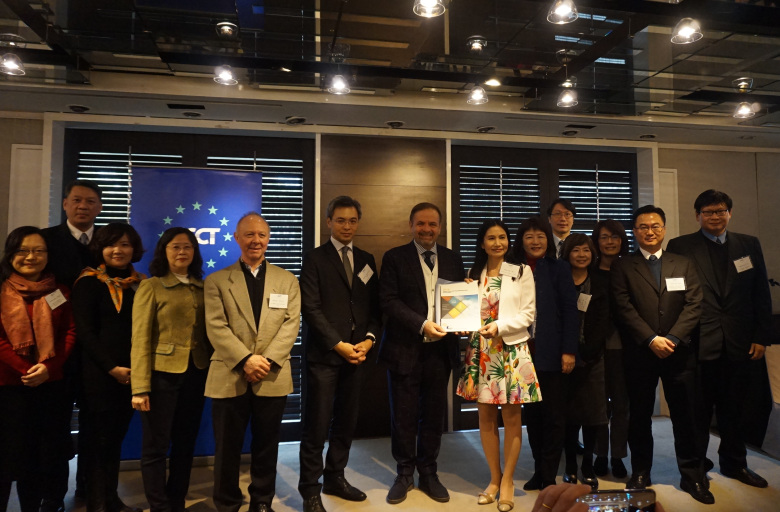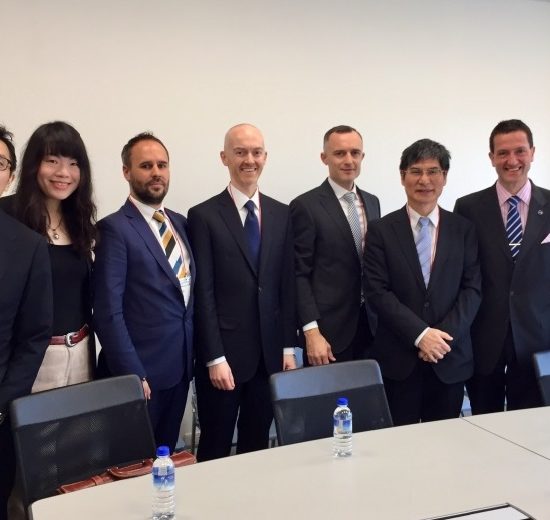Lunch with the FDA Director-General

The ECCT's Pharmaceutical, Medical Devices, Cosmetics and Retail & Distribution committees jointly hosted a lunch with Dr Wu Shou-mei, Director-General of the Taiwan Food & Drug Administration (FDA) under the Ministry of Health & Welfare (MOHW). The event featured a presentation by the speaker in which she gave an overview of the FDA’s main policy goals and priorities for the year ahead. After her presentation, there was a lengthy Q&A session in which Dr Wu and several FDA officials, who were seated a various tables at the event, answered questions from representatives of the four committees hosting the event.
In June 2016 President Tsai Ing-Wen issued a “five-point food safety policy” for national food safety. The five points were designed to cover the entire chain from sourcing to oversight and are as follows: 1) Strengthen source control management; 2) Re-establish the food production-management system; 3) Strengthen government market inspection capabilities; 4) Increase liabilities for producers and vendors and 5) Encourage and create oversight platforms.
Dr Wu emphasised that to achieve the objectives of the five-point policy requires cooperation between all the main stakeholders to better implement an integrated food safety management system. The FDA is working with other agencies to better coordinate government administration, increase industry self-regulation and public involvement to protect food safety. In particular, she singled out the Environmental Protection Administration (EPA), which needs to set good environmental standards, and the Council of Agriculture (COA), to set and monitor agricultural policies.
In terms of the industry’s contribution, the government hopes that all players will take their responsibilities seriously to provide safe and high-quality products. This would lessen the authority’s burden of oversight, which is nevertheless necessary to ensure that they are all following the rules. In terms of policies to advance the clinical trial management process, the FDA plans to improve clinical trial review efficiency by refining the informational new drug (IND) amendment based on the degree of change, enhance the connection between new drug applications and Good Clinical Practice (GCP) inspections and enhance the quality of bioequivalence studies.
A breakthrough therapy designation was announced on 12 February 2018 to allow the prioritisation of reviews for certain drugs. To qualify, drugs need to be able to treat serious conditions or rare diseases or show a substantial improvement compared to existing drugs. DG Wu noted that there had not been many clinical trials conducted in Taiwan and hopes that there will be more in the future.
A newly construct regulatory framework for regenerative medicinal products and medical treatment has been introduced. A draft Regenerative Medicinal Product Act on the subject was completed in October 2018. The bill is still being reviewed in the legislature but if it passes, additional regulations and measures will be passed including the Regulation Governing the Application of Specific Medical Examination Technique and Medical Device.
For medical devices, the new Act for the Management of Medical Devices (MDA) has not yet been passed by legislature. Once passed, the act will implement a new classification system for medical devices, encourage R&D innovation, formulate regulations for clinical trials, strengthen management of medical device manufacturers and internationalise quality management systems of medical devices.
In terms of priorities, implementation of the MDA will be the top priority. In terms of pre-market controls, the FDA’s priority is to optimize the review process and develop regulatory practices for emerging medical devices. In terms of clinical trials, the priority is to develop “Guidelines for Medical Device Good Clinical Trial Operations” and make clinical trial information public. In terms of post-market controls, the priority is to strengthen post-market safety/quality surveillance mechanisms and enhance the auditing of Class 1 (low risk products) licenses.
On the subject of cosmetics, following the passage of the Cosmetic Hygiene and Safety Act in May 2018, the intention is to shift the emphasis from government to industry self-regulation, although there will still be a transition period for various aspects. For example, pre-market approval for specific purpose cosmetics products will still be required during a five-year grace period. Other changes that will be brought about include the abolition of pre-market approval of colorants and the abolition of criminal punishment in favour of an increase in administrative fines.
Following Dr Wu’s presentation, there was an extensive 30-minute Q&A session in which Dr Wu and FDA officials present provided detailed answers to questions from ECCT members representing the various committees.

